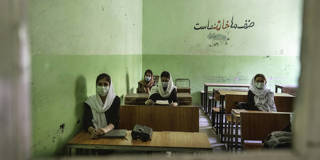When G7 leaders convene this week to discuss Afghanistan, they should be clear about the core goals: extricate their nationals and Afghan partners, and then work constructively with China, Russia, and other interested parties to end the country's 40-year downward spiral. Enough of destruction; it is time to build.
NEW YORK – This week, G7 leaders will convene to discuss Afghanistan. It’s crucial that the G7 leaders think clearly about the important objectives for Afghanistan in order to avoid adding yet another cycle of misery, bloodshed, and mass refugee flows.
Above all, they should use the meeting merely to coordinate policies among the seven countries in preparation for actions by the far more important venue, the United Nations Security Council. Without China and Russia at the table, there is no possibility of a coherent international approach to Afghanistan.
With this in mind, the G7 should aim to engage with Afghanistan under the Taliban, not isolate or starve the country. This is important not only as a short-run tactic to help get Westerners and vulnerable Afghans out of the country peacefully, but also to avoid future bloodbaths, humanitarian crises, and refugee surges. As tempting as it will be for the United States and its G7 allies to put a long-term hold on Afghanistan’s foreign-exchange reserves, freeze development aid, and intensify US (and possibly UN) sanctions, such an approach is doomed to fail, just as predictably as the 20-year NATO mission has just failed.

NEW YORK – This week, G7 leaders will convene to discuss Afghanistan. It’s crucial that the G7 leaders think clearly about the important objectives for Afghanistan in order to avoid adding yet another cycle of misery, bloodshed, and mass refugee flows.
Above all, they should use the meeting merely to coordinate policies among the seven countries in preparation for actions by the far more important venue, the United Nations Security Council. Without China and Russia at the table, there is no possibility of a coherent international approach to Afghanistan.
With this in mind, the G7 should aim to engage with Afghanistan under the Taliban, not isolate or starve the country. This is important not only as a short-run tactic to help get Westerners and vulnerable Afghans out of the country peacefully, but also to avoid future bloodbaths, humanitarian crises, and refugee surges. As tempting as it will be for the United States and its G7 allies to put a long-term hold on Afghanistan’s foreign-exchange reserves, freeze development aid, and intensify US (and possibly UN) sanctions, such an approach is doomed to fail, just as predictably as the 20-year NATO mission has just failed.